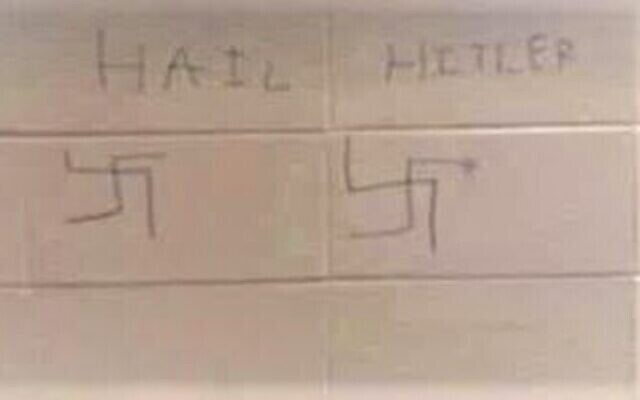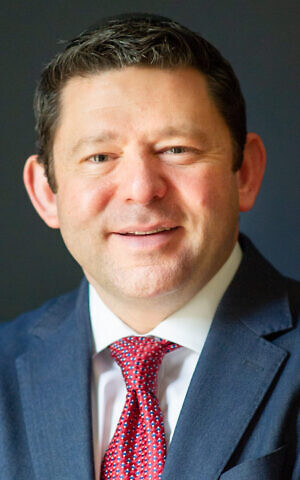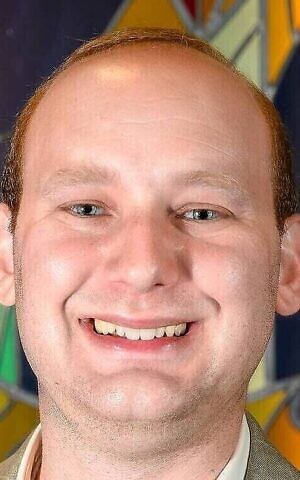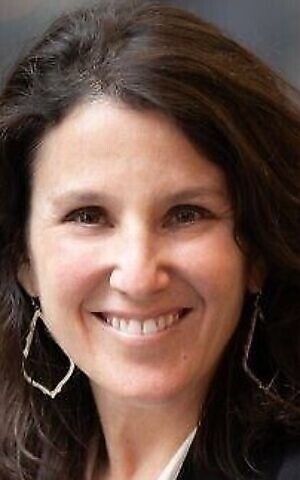Cobb Student Apologizes for Anti-Semitic Graffiti
Some of the Jewish students approached the 15-year-old afterwards and said they accepted his apology.

Two months after the shocking swastikas and “heil Hitler” graffiti were scrawled in two Cobb County high schools, one of the young offenders has apologized for his unthinking actions and, according to one Cobb rabbi, is going through the process of tshuvah, or repentance.
“The father and son took the initiative to contact me, and we met for one and a half hours, talking about the impact of his actions,” said Rabbi Larry Sernovitz, senior rabbi at Temple Kol Emeth. “I felt remorse from the son and a feeling of sadness and guilt. I saw the humanity in this child as he was grappling with the impact of his actions that he didn’t anticipate. I shared with him about the Holocaust and about the process of tshuvah.”

However, Sernovitz shared Holocaust survivor Elie Weisel’s contention that apologies must be made to those impacted in the community. He offered to give the student an opportunity to read his written apology directly to Cobb high school students and parents at an upcoming program about anti-Semitism. Sernovitz invited his young congregants and also invited high school students from Congregation Etz Chaim to a private, by invitation-only program that was held at Temple Kol Emeth. Because he is a minor, he remains unidentified.
“This was a challenging moment for all of us,” said Sernovitz, recalling when the 15-year-old read aloud his letter of apology and then answered questions that had been submitted earlier. “It didn’t take away from what the child had done and the impact on those in Atlanta and around the country. Some people who attended didn’t like the format and the remarks, but the majority of the community was grateful for being with the student in the process of tshuvah.”
That process may include joining Sernovitz at the Breman Museum to learn more about the Holocaust. And, after a subsequent call with the father, Sernovitz said the student may perform a community service such as planting flowers for the Daffodil Project, one flower representing each of the 1.5 million Jewish children killed in the Holocaust.
“I believe the apology was authentic,” said Sernovitz. “I believe this student is suffering and will go through a process for a long time.”
Some of the Jewish students approached the 15-year-old afterwards and said they accepted his apology. He was also invited to share in celebrations of Chanukah, which was just around the corner at that point.

According to Rabbi Daniel Dorsch at Congregation Etz Chaim, some of his congregation’s teens who were invited at the last minute to the program, knew the Pope High School student from homeroom. “To get up in front of a group of kids and reflect on what he did and admit to making a mistake was courageous,” said Dorsch. “But the courage works both ways. It was also courageous for my kids to come. There are a lot of layers that continue to be unpacked in Cobb schools.”
Allison Padilla-Goodman, vice president of the southern division of the Anti-Defamation League, who led the parent training workshop on anti-Semitism after the apology was made, also told the AJT that it was “incredibly brave of that young man. It was not necessarily an audience that was excited to see him.”
But she thought that Sernovitz “framed it perfectly as an act of apology in Jewish values. I’m not sure I have ever seen anything like this.”
Padilla-Goodman said “it was clear from this young man that if somebody had stood up to him, I don’t think he would have done it. He didn’t harbor hatred to Jews. He had Jewish friends. We talk a lot about standing up to hatred at its lowest levels, especially with people who are close to you in your life – those who will listen to you.”
In fact, in her subsequent workshop for the parents, she talked about how young people need to be given the tools to stand up to hatred. “There are ways to use the language,” when one hears something anti-Semitic, or anti-Israel or anti-anyone. She suggested that a person hearing this hatred, ask a question, or say they are uncomfortable with that statement or just say, “that’s not cool.”

Padilla-Goodman stressed that these kinds of tools and ideas are why the ADL No Place for Hate initiative is so crucial. “We have more schools than ever” offering this program, including 500 across the Southern division and 260 in Georgia alone. “Every Atlanta school offers No Place for Hate,” except Cobb County which barred it last June after the Cobb school board passed a resolution banning Critical Race Theory and The New York Times’ 1619 project from being taught in district schools. The resolution didn’t specify what CRT was, but the board dropped the No Place for Hate initiative.
“Schools need to address how to navigate hatred,” Padilla-Goodman emphasized.
As far as the Cobb student’s apology, she said, “I hope the [Jewish] students learned from it. They saw a young man who made a bad decision and confronted that decision in front of a scary audience. I hope they saw him as a humble human who wanted to find understanding. We all felt the need for grace and need for education.”
Dorsch observed that the teen’s father was very “stoic in an obviously grave situation. The kid has not returned to school [since the incident]. It’s obviously had a big impact on their life.” He was referring to the fact that the teen was expelled from school as a result of his participation in the graffiti.
According to Sernovitz, “there are different reasons why people participate in anti-Semitic hate crimes. This kid is not anti-Semitic in his heart. I believe we have the opportunity to create an ally in him.” He added, “I feel the gravity of the moment. I feel honored to help in this restorative just process. It’s a learning experience all around.”
- News
- Local
- Jan Jaben-Eilon
- Pope High School
- anti-Semitic graffiti
- Allison Padilla-Goodman
- Anti-Defamation League Southeast
- Rabbi Daniel Dorsch
- congregation etz chaim
- Rabbi Larry Sernovitz
- Temple Kol Emeth
- Cobb County Board of Education
- tshuvah
- holocaust
- Elie Weisel
- Cobb High School
- Anti-Semitism
- young congregants
- high school students
- Breman Jewish Heritage Museum
- Daffodil Project
- Community Service
- Jewish children
- Chanukah
- workshop
- anti-Semitic
- Anti-Israel
- No Place for Hate Initiative
- Critical Race Theory



comments